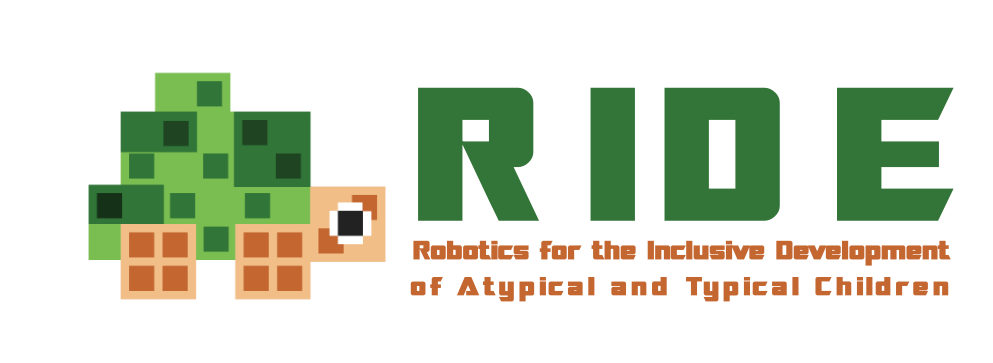The RIDE project

Robotics for the Inclusive Development of Atypical and Typical Children
(2019-1-HU01-KA201-061275)
The Project has come to an end, and we are proud to show that all our goals were achieved! Below you can read the ideas in the project and its outputs!
Within this research program, we aimed to develop and test a modular matrix which helps teachers and children through robotics, supporting the development of skills in the children age range 6-14 years.
The learning materials were developed through this three-year project, involving several european institutions, merging their professional experience.
The modular matrix include 9 stories with their documentations. They are aimed at building and developing computational and cognitive skills. Ideas and inspirations, teacher guides and teacher training programmes were developed on different fields. Both typical and atypical developing children were involved according to the inclusive perspective of learning.
Cooperative partners:
Coordinator:
- Abacusan Stúdió (Hungary)
Co-operants of development:
- ELTE Bárczi Gusztáv Gyógypedagógiai Kar (Hungary)
- Libera Universita di Bolzano – UNIBZ (Italy)
- Interonline Cooperacion 2001 (Spain)
Co-operants of testing:
- Rákospalotai Meixner Általános Iskola és AMI (Hungary)
- Istituto Comprensivo di scuola primaria e secondaria di I grado Johannes Amos Comenius (Italy)
- Scoala Gimnaziala Speciala SF NICOLAE (Romania)
During the collaboration, all partners participated to the project with their own knowledge and experience.
The universities (ELTE and UNIBZ) provided the development of the learning materials, the several developmental fields related to scientific background, and test the learning materials through scientifically-based methodologies.
The companies worked on teaching robotics and developing learning materials (Abacusan and Interonline). In the knowledge of the widespread potential of ArTeC robotics, they provided the project with their experience about product development, project management, and practical development of teacher education.
The schools (Meixner, Comenius, SF Nicolae) took part in the testing of the produced materials. Moreover, they helped by providing feedback on the learning materials and teacher training, as well as in the communication between their groups of children actively participating in the project.
Output:
The Website of the project, where you can download all the materials!
The papers originated from the project:
- Kálózi-Szabó, C., Mohai, K., Cottini; M. (2022). Employing robotics in education to enhance cognitive development - A pilot study. Sustainability, 22, .
- Tovazzi, A., Basso, D., Caprara, B., & Colombi, A.E. (2021). Pequeńos bloques para grandes avances: Un enfoque didáctico basado en la neurociencia. In: A. R. Bodoque-Osma & S. Gonzáles-Víllora (Eds.), Neuroeducación: Desde la Psicología a la Motricidad. Editorial Morata, Madrid (pp. 215-232). ISBN: 9788418381591.
- Moschella, M., & Basso, D. (2020). Computational Thinking, spatial and logical skills. An investigation at primary school. Ricerche di Pedagogia e Didattica, 15(2), 69-89. DOI: 10.6092/issn.1970-2221/11583

